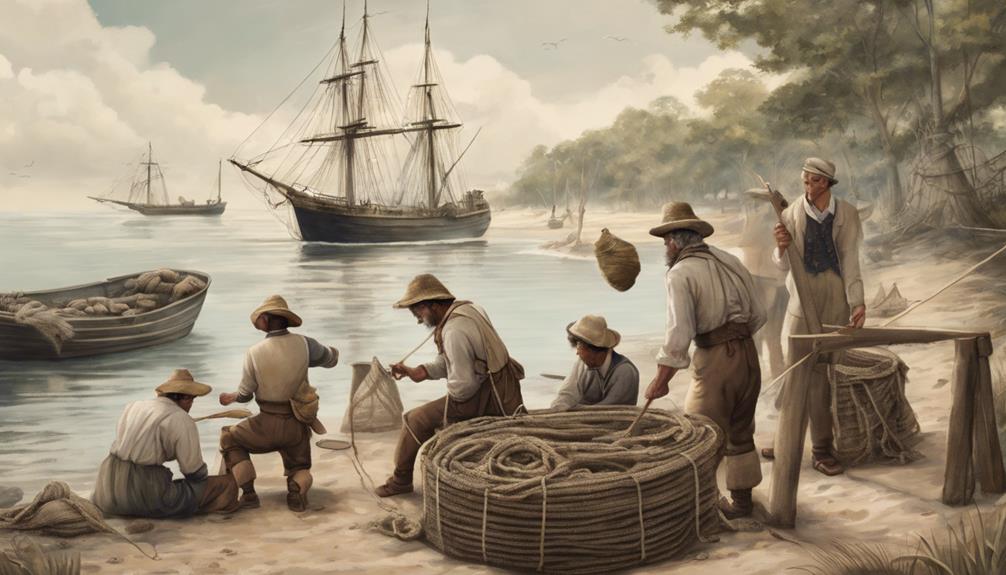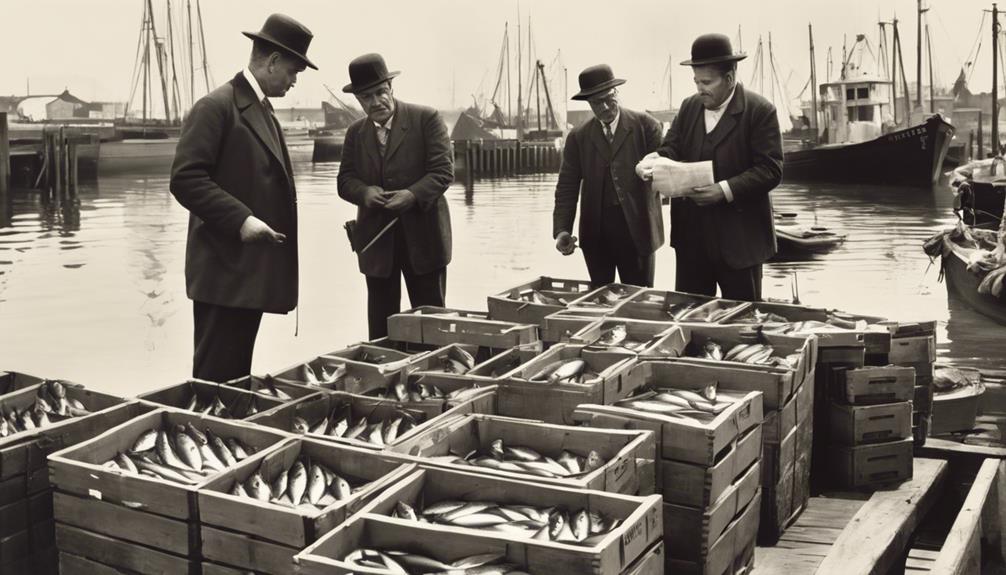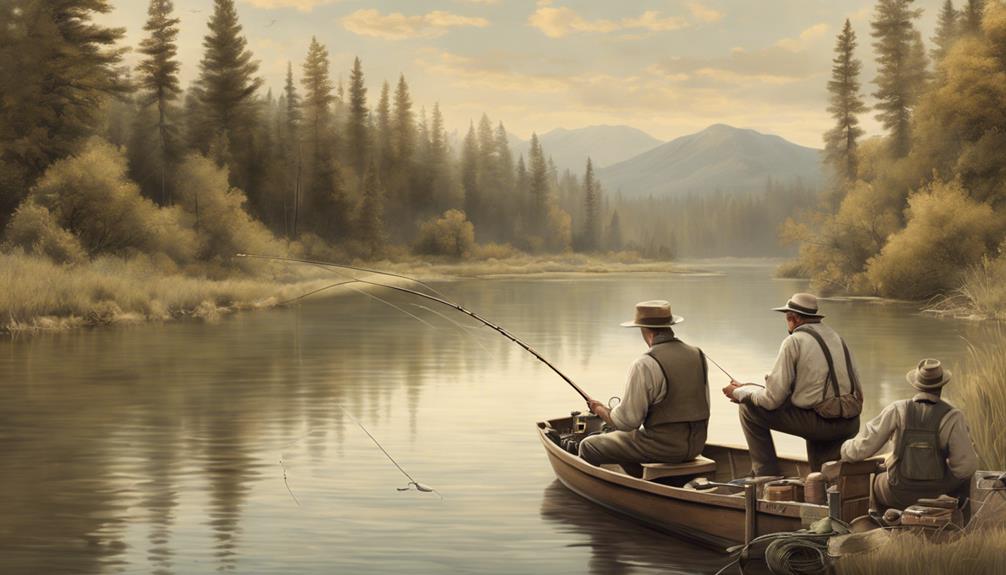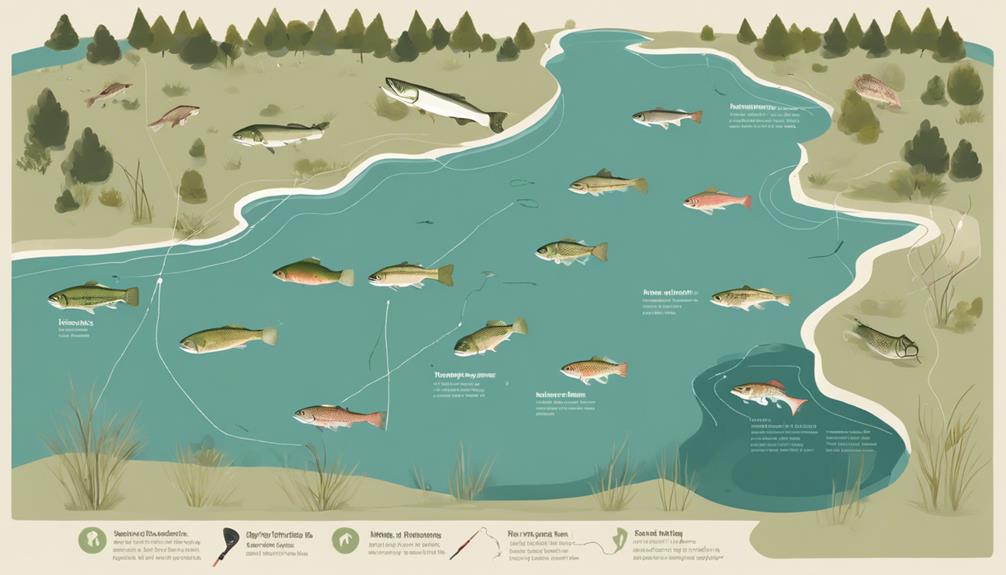Explore the ancient roots of fishing laws! Magna Carta started it all in 1215, paving the way for regulations. Avoid trouble with Black Acts by respecting landowners. Edward I's 1275 Statute of Westminster safeguarded fish stocks. Forest Laws post-Westminster capped angling to preserve wildlife. Victorian Era saw rules aligning with conservation goals. Colonial regulations varied, from strict Massachusetts rules to Virginia's trade focus. Fast forward to modern angling laws—angling clubs teach sustainability. Tariff Acts monitor fish imports for economic balance. Cross-border efforts ensure fishy harmony. Fishery Act of 1891 marked a shift towards sustainability. World War I showcased fishing's adaptability. Today's rules sustain habitats and fish populations. To uncover more on these fascinating tips, continue your exploration!
Magna Carta and Fishing Rights
Exploring the historical significance of the Magna Carta reveals insightful provisions regarding fishing rights that laid the foundation for angling laws in centuries to come. The Magna Carta, issued in 1215, is a foundational document in English legal history. Among its many clauses, the charter included specific provisions related to fishing rights, highlighting the importance of fisheries even in those early times. These clauses initiated the evolution of fishing rights and set the stage for legal challenges and developments in the field.
The fishing rights evolution sparked by the Magna Carta paved the way for modern angling laws. The provisions established in the charter aimed to regulate fishing practices, ensuring sustainability and fair access to fish stocks. These early regulations were crucial in shaping the way fishing activities were conducted and managed over the centuries. They set a precedent for the development of more comprehensive fishing laws and regulations that continue to govern fisheries management today.
The historical significance of the Magna Carta's provisions on fishing rights extends to modern implications. The principles laid out in the charter regarding fair access to fishing grounds and sustainable fishing practices are still relevant today. They serve as a reminder of the importance of balancing conservation efforts with the needs of fisheries-dependent communities. Understanding the origins of angling laws through the lens of the Magna Carta provides valuable insights into the ongoing challenges and debates surrounding fishing rights and resource management.
Black Acts and Poaching Laws
The enforcement of Black Acts and poaching laws during the historical period significantly impacted the regulation of fishing and angling practices. Poaching, the illegal hunting or capturing of fish, was a prevalent issue that led to the implementation of strict penalties under the Black Acts. These laws aimed to protect the rights of landowners and prevent individuals from unlawfully taking fish from private waters. Poaching penalties varied but often included fines, imprisonment, and even transportation for repeat offenders.
Historical enforcement of poaching laws was rigorous, with authorities employing gamekeepers and water bailiffs to patrol rivers and lakes, ensuring compliance. The penalties served as a deterrent, dissuading individuals from engaging in illegal fishing activities. The Black Acts also granted landowners the authority to prosecute poachers, further strengthening the enforcement of these laws.
The impact of the Black Acts and poaching laws extended beyond penalties; they influenced the development of early conservation efforts. By safeguarding fish populations and habitats from overexploitation, these laws inadvertently contributed to the preservation of aquatic ecosystems. Additionally, the enforcement of poaching laws set a precedent for future regulations governing fishing practices.
Understanding the historical context of poaching penalties and enforcement provides valuable insights into the evolution of fishing laws and their role in shaping modern angling practices. By recognizing the significance of these laws, anglers can appreciate the long-standing efforts to protect fisheries and promote sustainable fishing practices.
Statute of Westminster and Fisheries
With the enactment of the Statute of Westminster, regulations concerning fisheries underwent significant changes, impacting the management and conservation of aquatic resources. This historical significance marked a shift in fishing practices and legal frameworks, introducing new measures to govern the utilization of marine resources.
The Statute of Westminster, passed in 1275 during the reign of Edward I, established rules aimed at preserving fish stocks and regulating fishing activities. It set out specific guidelines for fishing practices, such as restrictions on net sizes, fishing seasons, and prohibited methods to prevent overfishing and depletion of fish populations. These regulations were crucial in maintaining sustainable fishing practices and ensuring the long-term viability of fish stocks.
One of the key impacts of the Statute of Westminster was the establishment of a legal framework for fisheries management. By laying down clear rules and penalties for violations, the statute aimed to deter illegal fishing activities and protect the interests of both fishers and the ecosystem. This legal structure provided a basis for future fishing laws and laid the foundation for modern fisheries management practices.
Forest Laws and Fishing Restrictions
Following the regulations set by the Statute of Westminster, the implementation of Forest Laws introduced additional restrictions on fishing practices to further protect natural resources and maintain ecological balance. Conservation efforts became a focal point in the management of fishing reserves as Forest Laws aimed to ensure sustainable practices. These laws recognized the environmental impact of unrestricted fishing practices and sought to mitigate potential harm to aquatic ecosystems.
Under Forest Laws, fishing restrictions were put in place to prevent overexploitation of fish populations and preserve biodiversity. Specific areas were designated as fishing reserves where only regulated fishing activities were permitted. These reserves served as sanctuaries for fish to breed and thrive, contributing to the overall health of aquatic environments.
Moreover, Forest Laws emphasized the importance of responsible fishing practices to minimize negative impacts on marine life and habitats. By implementing regulations on fishing techniques and catch limits, these laws aimed to strike a balance between human needs and environmental conservation.
Game Laws and Angling Privileges
Implementing Game Laws and Angling Privileges entails a comprehensive framework that governs recreational fishing activities and establishes rights and responsibilities for anglers. Fishing seasons are crucial components of these regulations, dictating when anglers can pursue specific species to prevent overfishing and protect breeding populations. Conservation lies at the heart of game laws, ensuring that aquatic ecosystems remain healthy and balanced for future generations to enjoy.
Licensing requirements are another essential aspect of angling privileges, with authorities mandating that individuals obtain permits to fish legally. These licenses not only help fund conservation efforts but also enable governing bodies to track angler numbers and enforce catch limits effectively. Catch limits are carefully calculated restrictions on the number and size of fish that can be harvested, preventing depletion of fish stocks and promoting sustainable fishing practices.
Navigation Acts and Fishing Trade
Exploring the historical impact of Navigation Acts on the fishing trade reveals intricate connections between maritime policies and commercial fishing practices. During the 17th and 18th centuries, Navigation Acts were a series of laws enacted by the British Parliament to regulate trade and commerce within the colonies. These acts aimed to ensure that only English or English colonial ships could access certain trade routes and engage in maritime commerce, thereby restricting foreign competition and bolstering the British economy.
The Navigation Acts significantly influenced the fishing trade by dictating which vessels could partake in fishing activities along specific routes. British fishing vessels were granted preferential treatment, giving them a competitive edge in exploiting fishing grounds and transporting goods back to England. This exclusivity over trade routes allowed British fishermen to establish dominance in maritime commerce, leading to the growth of the fishing industry as a vital component of the British economy.
Moreover, the Navigation Acts not only shaped the fishing trade but also impacted international relations and colonial economies. By restricting foreign access to certain trade routes, these laws sparked tensions with other European powers seeking to expand their commercial influence. The enforcement of these acts safeguarded British interests in maritime commerce, laying the groundwork for the development of a robust fishing industry that played a crucial role in the economic prosperity of the British Empire.
Colonial Fishing Regulations

Regulations governing fishing activities in the colonies intricately intertwined with economic policies and colonial development. Colonial fishing practices were deeply rooted in the traditions brought over from Europe, adapted to the local marine resources and conditions. In the early colonial period, fishing was a crucial economic activity, providing food security and a source of income for many settlers. Various colonies had their own fishing regulations, often tailored to suit the specific needs of the local communities and to protect fish stocks.
For instance, Massachusetts Bay Colony implemented strict rules regarding the size of fish that could be caught, aiming to ensure sustainable fishing practices. Similarly, Virginia focused on promoting the export of fish to other colonies and Europe, leading to the development of a thriving fishing industry along the Chesapeake Bay. These regulations not only controlled the exploitation of fish stocks but also influenced the social and economic fabric of the colonies.
The fishing traditions in colonies differed based on factors such as geographical location, available fish species, and cultural influences. In New England, for example, cod fishing was a dominant practice due to the abundance of cod in the Atlantic waters. On the other hand, in the southern colonies, fishing activities were more diverse, including shellfish harvesting and freshwater fishing. Understanding these colonial fishing regulations provides valuable insights into the historical development of fishing industries in the early American colonies.
Fisheries Act of 1772
The Fisheries Act of 1772 significantly impacted the management and oversight of fishing activities in the American colonies during the pre-revolutionary period. This legislation was a response to the growing concerns about the depletion of fish stocks and the need to regulate fishing practices. One key aspect of the Fisheries Act of 1772 was the establishment of fishing rights, which aimed to define who could fish in specific waters and under what conditions. These fishing rights were often granted to individuals or groups by colonial authorities, marking a shift towards more controlled access to fishing grounds.
Moreover, the Fisheries Act of 1772 also introduced early conservation efforts aimed at protecting fish populations from overexploitation. By setting limits on the types of fishing gear that could be used and the quantities of fish that could be caught, this legislation laid the groundwork for future conservation measures. It recognized the importance of preserving fish stocks for future generations and highlighted the need for sustainable fishing practices.
Angling Clubs and Bylaws

Amidst the historical backdrop of fishing regulations, angling clubs and their bylaws have emerged as pivotal institutions shaping the recreational fishing landscape. These clubs play a crucial role in promoting sustainable fishing practices and fostering conservation efforts. Angling clubs often establish specific rules and regulations, known as bylaws, that aim to protect fish populations and their habitats while ensuring an enjoyable fishing experience for members.
One key aspect of angling clubs is their focus on conservation efforts. By implementing catch and release practices, size limits, and seasonal restrictions, these clubs actively contribute to preserving fish stocks and maintaining ecological balance in the waters they frequent. Through educational initiatives and community engagement, angling clubs raise awareness about the importance of sustainable fishing practices and the need to protect the environment for future generations.
Moreover, angling clubs serve as platforms for like-minded individuals to come together, share knowledge, and collaborate on various conservation projects. By fostering a sense of camaraderie and stewardship among members, these clubs create a supportive community dedicated to safeguarding natural resources. Additionally, angling clubs often organize clean-up events, habitat restoration projects, and advocacy campaigns to further their conservation objectives.
In essence, angling clubs and their bylaws not only regulate fishing activities but also play a vital role in promoting environmental stewardship and conservation efforts within the recreational fishing community.
Victorian Era Fishing Laws
During the Victorian Era, fishing laws underwent significant reforms to address the growing concerns over dwindling fish populations and unsustainable harvesting practices. Victorian conservation efforts played a crucial role in shaping these laws, as the era marked a shift towards recognizing the importance of preserving fish populations for future generations. Anglers were beginning to understand the impact of overfishing and the need for sustainable practices to maintain the delicate balance of marine ecosystems.
Moreover, during this period, social status often dictated one's ability to fish in certain areas or for specific species. Fishing etiquette became a prominent aspect of angling culture, with rules governing behavior while fishing and interacting with fellow anglers. These rules weren't only about conservation but also about maintaining decorum and respect for the sport and the environment.
The Victorian Era marked a significant turning point in fishing laws, with a growing awareness of the need for conservation and sustainable practices. Anglers weren't only bound by legal regulations but also by societal expectations regarding their behavior while fishing. This era laid the groundwork for modern fishing regulations and highlighted the importance of balancing human needs with environmental preservation.
Tariff Acts and Fish Imports

In the realm of trade and conservation, the interplay between tariff acts and fish imports holds significant implications for both economic sustainability and environmental protection. Trade agreements play a crucial role in regulating the importation of fish products, aiming to balance the demand for imported fish with the need for fish conservation. Import quotas are often established to prevent overfishing and promote sustainable fishing practices. By limiting the quantity of fish that can be imported, countries can protect their own fish populations and ecosystems from depletion while also supporting local fishermen and businesses.
These tariff acts not only influence the availability of certain fish species on the market but also contribute to the larger global effort towards responsible fishing practices. By controlling the flow of fish imports, governments can encourage adherence to regulations that promote the long-term health of marine environments. Moreover, import tariffs can be used as economic tools to incentivize compliance with sustainable fishing standards, rewarding countries that prioritize conservation efforts.
North American Fishing Treaties
The impact of North American Fishing Treaties on cross-border fish conservation efforts and sustainable fishing practices is a significant aspect of international cooperation in the realm of fisheries management. These treaties play a crucial role in addressing key issues such as Indigenous fishing rights and conservation, as well as resolving Canadian-US fishing disputes through diplomatic means rather than escalating conflicts.
Indigenous fishing rights are a central component of many North American Fishing Treaties. These agreements recognize the historical fishing practices of Indigenous communities and aim to protect their rights to fish for sustenance and ceremonial purposes. By incorporating these rights into the treaties, there's a concerted effort to balance conservation goals with the cultural and traditional needs of Indigenous peoples.
Moreover, Canadian-US fishing disputes have been a recurring challenge in North American waters. The treaties establish frameworks for collaboration and conflict resolution mechanisms to prevent these disputes from escalating into full-blown conflicts. By setting out clear guidelines for shared fisheries management, these agreements promote sustainable fishing practices and ensure the long-term health of fish populations in the region.
Fisheries Act of 1891

Enacted in 1891, the Fisheries Act marked a pivotal moment in the regulation and management of North American fish stocks, shaping the foundation for modern fisheries governance. The act introduced significant changes that aimed to address the pressing issues surrounding fisheries management. Here are some key aspects to consider:
- Conservation Measures: The Fisheries Act of 1891 laid the groundwork for implementing conservation measures to ensure the sustainability of fish populations. It established regulations on catch limits, fishing seasons, and gear restrictions to prevent overfishing and depletion of fish stocks.
- Sustainability Practices: With a growing awareness of the importance of sustainable fishing practices, the act encouraged the adoption of sustainable methods to maintain the long-term health of fisheries. It promoted sustainable harvesting techniques and emphasized the need to protect the marine ecosystem.
- Economic Impacts: The Fisheries Act had significant economic impacts on commercial fishing operations. By regulating fishing activities, the act aimed to prevent the decline of fish stocks, ultimately safeguarding the livelihoods of those dependent on the fishing industry.
- Commercial Fishing Trends: The implementation of the Fisheries Act influenced commercial fishing trends by shifting the focus towards responsible and sustainable practices. It encouraged fishers to adapt their methods to align with conservation goals, leading to a more sustainable approach to commercial fishing.
The Fisheries Act of 1891 set a precedent for future fisheries management strategies, emphasizing the importance of conservation, sustainability, and responsible fishing practices.
Angling in World War I
Building upon the foundation set by the Fisheries Act of 1891, the impact of angling during World War I on fishing practices and conservation efforts is a significant aspect worth exploring. During this tumultuous time, angling took on a new dimension as soldiers found solace and sustenance through trench fishing. Despite the chaos of war, the act of fishing provided a sense of normalcy and relief from the harsh realities of battle.
Wartime angling wasn't without its challenges, as military fishing regulations were put in place to ensure the sustainability of fish populations amidst the chaos of war. These regulations aimed to prevent overfishing and maintain ecological balance even during times of conflict. Anglers had to adapt to these new rules, showcasing the resilience and flexibility of the fishing community during challenging times.
Fishing during war wasn't just a means of recreation but also a way to supplement rations and provide a source of fresh food for soldiers. Trench fishing allowed troops to connect with nature and escape the harsh conditions of the battlefield, highlighting the therapeutic benefits of angling during times of crisis.
Angling Regulations Today

Understanding the contemporary landscape of angling, current fishing regulations play a crucial role in maintaining sustainable fish populations and preserving aquatic ecosystems. As an angler, it's essential to stay informed about the regulations in place to ensure responsible fishing practices. Here are some key aspects of angling regulations today:
- Catch Limits: Authorities establish catch limits to prevent overfishing and ensure the long-term health of fish populations. By adhering to these limits, anglers contribute to conservation efforts and help maintain balanced ecosystems.
- Conservation Efforts: Many regulations focus on conservation efforts, such as protecting endangered species and preserving fragile habitats. Anglers play a vital role in these efforts by following regulations aimed at safeguarding biodiversity.
- Technology Advancements: Modern technology has led to innovations in fishing gear, making angling more efficient. However, regulations often address the use of technology to prevent unsustainable practices that could harm fish populations or their habitats.
- Fishing Gear: Regulations also govern the types of fishing gear allowed in certain areas to minimize environmental impact. By using approved gear and techniques, anglers can enjoy their sport while minimizing harm to aquatic ecosystems.
Frequently Asked Questions
Can I Fish in a Private Pond Without Permission?
Yes, fishing in a private pond without permission is considered trespassing, which can have legal consequences. Landowners have the right to control access to their property, including bodies of water on their land.
It's important to always seek permission before fishing in a private pond to avoid any conflicts with the landowner and potential legal issues. Respecting landowner rights is crucial to maintain positive relationships and uphold the law.
Are There Restrictions on Using Certain Types of Bait?
When it comes to fishing, considering bait selection is crucial not only for attracting fish but also for minimizing environmental impact. Certain types of bait may have restrictions due to their potential harm to aquatic ecosystems.
To ensure sustainable practices, explore alternative bait options that are less damaging to the environment. By choosing wisely, you can enjoy fishing responsibly while preserving the delicate balance of marine life.
How Do I Obtain a Fishing License for Different Regions?
To obtain a fishing license for different regions, you need to research the specific fishing regulations and license requirements of each area you plan to fish in. Different regions may have varying rules and procedures for obtaining a fishing license.
Contact the local fish and wildlife department or visit their website to find detailed information on how to acquire the necessary permits. Following the guidelines ensures you comply with the fishing laws of each region.
What Penalties Exist for Violating Angling Regulations?
When you violate angling regulations, penalty consequences can be severe. Enforcement measures include fines, license suspensions, and even confiscation of equipment.
It's crucial to familiarize yourself with the specific rules in each region to avoid such penalties. Ignorance of the law isn't an excuse, so make sure to stay informed and abide by the angling regulations to prevent facing these enforcement actions.
Are There Specific Rules for Catch-And-Release Fishing?
When engaging in catch-and-release fishing, it's crucial to prioritize fish welfare and ethical practices. This involves handling the fish gently, using barbless hooks to minimize harm, and ensuring proper release techniques to boost fish survival rates.
Respect the regulations on handling fish during catch-and-release to maintain a sustainable and ethical angling practice. Remember, following these guidelines contributes to the well-being of fish populations and promotes responsible fishing habits.
Conclusion
In conclusion, understanding historic fishing and angling laws provides valuable insights into the development of fisheries management and conservation efforts over time.
By examining the legal frameworks that have shaped fishing practices, anglers can appreciate the importance of regulations in ensuring sustainable fishing practices for future generations.
From Magna Carta to modern angling regulations, the evolution of fishing laws reflects societal values and environmental concerns that continue to guide our approach to managing fisheries today.



